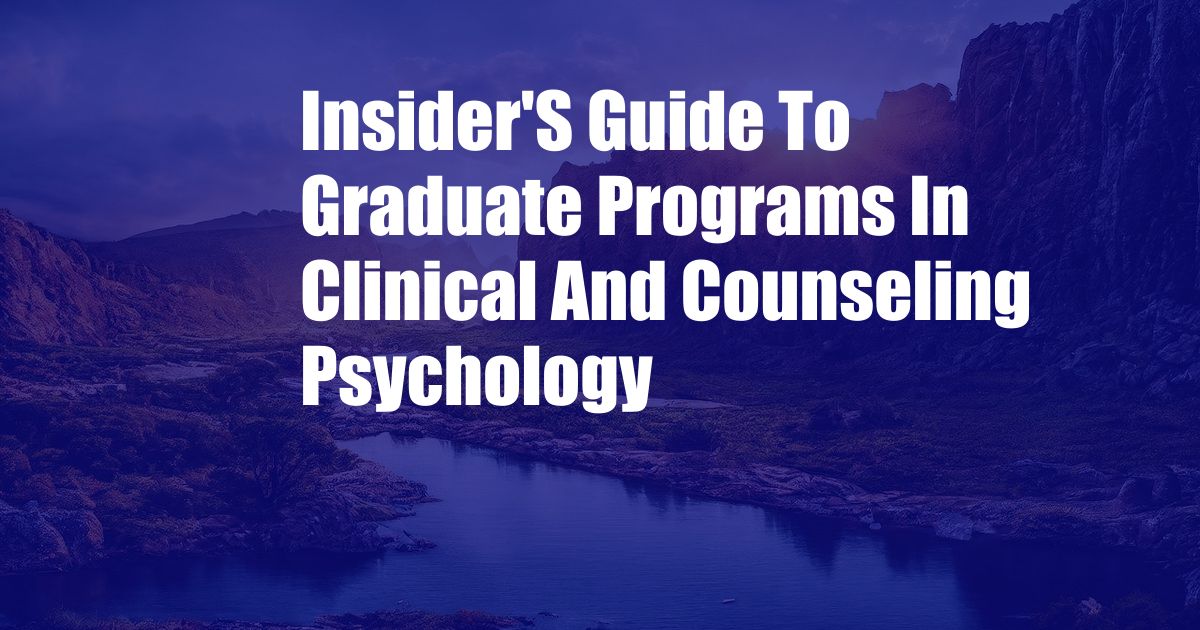
The Insider’s Guide to Graduate Programs in Clinical and Counseling Psychology
As a recent graduate of a clinical psychology program, I can still remember the feeling of being overwhelmed by the sheer number of options. With so many different programs out there, it can be hard to know where to start. That’s why I’ve put together this guide to help you navigate the process of finding the right graduate program for you. Here are my top tips for applying to graduate school in clinical or counseling psychology:
In this comprehensive guide, we’ll delve into the intricacies of graduate programs in clinical and counseling psychology. We’ll explore the definitions, histories, and significance of these fields while unraveling the latest trends and developments shaping their landscapes. I’ll also share insider tips and expert advice to help you excel in your application and secure admission to the program that aligns with your aspirations.
Understanding Clinical and Counseling Psychology Programs
Clinical and counseling psychology programs provide advanced training in the assessment, diagnosis, and treatment of mental health disorders. Clinical psychologists focus on the diagnosis and treatment of severe mental illness, while counseling psychologists focus on helping individuals with everyday mental health issues.
Graduate programs in clinical and counseling psychology typically last for 5-7 years and culminate in a doctorate degree (PhD or PsyD). During this time, students complete coursework in psychology, research methods, and clinical practice. They also complete a supervised practicum and internship, which provide hands-on experience in the field.
Choosing the Right Program
The right graduate program for you will depend on your individual interests and goals. If you’re interested in working with people with severe mental illness, then you may want to consider a clinical psychology program. If you’re interested in helping people with everyday mental health issues, then you may want to consider a counseling psychology program.
Here are some of the things to consider when choosing a graduate program in clinical or counseling psychology:
- The program’s reputation and ranking
- The program’s faculty and research
- The program’s curriculum
- The program’s location
- The program’s cost
Tips for Applying to Graduate School
Once you’ve chosen a few programs that you’re interested in, it’s time to start applying. Here are some tips for applying to graduate school in clinical or counseling psychology:
- Start early. The application process can be lengthy, so it’s important to start working on your application early.
- Get your letters of recommendation in early. Letters of recommendation are an important part of your application, so make sure to ask for them early.
- Write a strong personal statement. Your personal statement is your chance to show the admissions committee who you are and why you’re interested in the program.
- Prepare for your interview. If you’re invited to interview, be sure to prepare. Research the program and practice answering common interview questions.
FAQ
Q: What are the differences between clinical and counseling psychology?
A: Clinical psychologists focus on the diagnosis and treatment of severe mental illness, while counseling psychologists focus on helping individuals with everyday mental health issues.
Q: What are the job prospects for clinical and counseling psychologists?
A: The job outlook for clinical and counseling psychologists is expected to grow in the coming years. This is due to the increasing demand for mental health services.
Q: How much do clinical and counseling psychologists earn?
A: The median annual salary for clinical and counseling psychologists is around $75,000. However, salaries can vary depending on experience, location, and other factors.
Conclusion
Applying to graduate school in clinical or counseling psychology can be a challenging process, but it’s also an exciting one. By following the tips in this guide, you can increase your chances of getting into the program of your choice. What are you waiting for? Start your journey today!